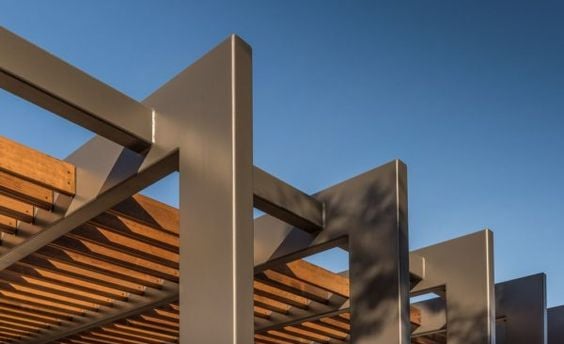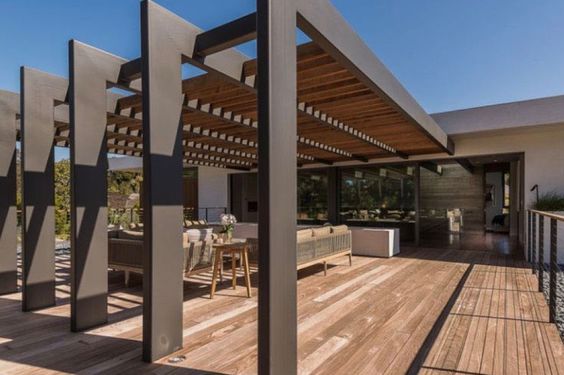Pergola Materials: Iron, Aluminum, and Wood
Blog post description.
9/6/20243 min leer
A pergola not only enhances the aesthetics of your garden or patio but also serves as a functional outdoor structure, providing shade and creating a unique atmosphere. Choosing the right material for your pergola is a crucial decision that affects its longevity, maintenance needs, and resistance to weather conditions. In this article, we will review the three most common pergola materials: iron, aluminum, and wood, to help you select the best option.
1. Iron Pergola
Durability and Resistance
An iron pergola is a strong and sturdy structure with a high load-bearing capacity, making it highly resistant to wind. However, its resistance to weather conditions varies. Iron is prone to rust, especially when exposed to moisture, so it requires regular maintenance.
Warranty and Lifespan
With proper maintenance, iron pergolas can last 15-20 years. The warranty period typically ranges from 5 to 10 years, depending on the manufacturer and construction quality.
Maintenance
Maintaining an iron pergola involves regular cleaning and corrosion protection. An annual inspection is recommended, and repainting with a specialized anti-corrosion paint may be necessary to prevent rusting.
Cost
Iron pergolas are generally more expensive than aluminum or wood structures due to the robust material and installation costs. Prices can vary widely, but they typically fall into the mid-to-high price range.
Unique Features
Iron pergolas are particularly striking in classic, elegant gardens and can be enhanced with custom wrought iron decorations. Due to their heavy weight, they are very stable but less mobile compared to pergolas made of other materials.
2. Aluminum Pergola
Durability and Resistance
Aluminum pergolas are highly resistant to weather conditions. Aluminum does not rust, making it an excellent choice for wet environments. It is also UV-resistant, protecting against the sun’s harmful rays. Aluminum pergolas are reliable in windy conditions as well, being both lightweight and strong.
Warranty and Lifespan
Aluminum pergolas can last 20-25 years with minimal maintenance. Manufacturers often provide warranties of 10-15 years, making them a sound long-term investment.
Maintenance
Aluminum pergolas require minimal maintenance. An annual thorough cleaning is usually sufficient to remove dust and dirt. It’s also advisable to periodically check the condition of screws and fasteners, but typically no major intervention is needed.
Cost
Aluminum pergolas are in the mid-range price category and offer excellent value for money due to their long lifespan. While they may be more expensive initially than wood pergolas, their low maintenance costs make them a cost-effective choice in the long run.
Unique Features
Aluminum pergolas are lightweight, making them easy to install and move. Many models feature a modern, sleek design that fits well into contemporary environments. Some aluminum pergolas come with motorized roofs that can be controlled by remote, adding convenience to their use.
3. Wood Pergola
Durability and Resistance
Wood pergolas offer natural beauty but are less resistant to weather conditions. Wood is prone to rotting, especially in wet environments, and may crack or warp over time. UV exposure can also damage wood, requiring protective treatments.
Warranty and Lifespan
The lifespan of wood pergolas ranges from 10 to 15 years, depending on the type of wood and maintenance. Manufacturers typically offer warranties of 5-7 years, which is contingent upon proper maintenance.
Maintenance
Wood pergolas require significant maintenance. They need to be treated annually with protective varnish or paint to safeguard against moisture and UV rays. Regular cleaning and repairs for weather-related damage, such as filling cracks, are also essential.
Cost
Wood pergolas vary in price, but they generally fall into the more affordable category. The cost depends on the type of wood (e.g., pine, oak, cedar). While the initial costs may be lower, the long-term maintenance expenses can make wood pergolas more costly overall.
Unique Features
Wood pergolas provide a natural, warm appearance that complements almost any garden. Wood is easy to work with, allowing for custom designs and decorations. Wood pergolas can also be easily combined with other materials, such as stone or metal, offering additional aesthetic possibilities.
Conclusion
Choosing the material for your pergola depends on your individual needs, local weather conditions, desired appearance, and how much time and effort you are willing to invest in maintenance.
Iron Pergola: A great choice if you want a durable, sturdy structure and don’t mind regular maintenance. Ideal for classic-style gardens.
Aluminum Pergola: Modern, easy to maintain, and long-lasting. Perfect for contemporary settings with minimal maintenance needs.
Wood Pergola: Provides a natural and warm look but requires more maintenance. Suits rustic and nature-inspired gardens.
The differences between these materials affect not only the appearance but also the lifespan, maintenance requirements, and costs, so it’s important to carefully consider which is the best option for you.


Sustainability
Expert landscape design for eco-friendly spaces.
Consultation
NewsLetter
bloomtecture@gmail.com
© 2024. All rights reserved.
+40775544206


